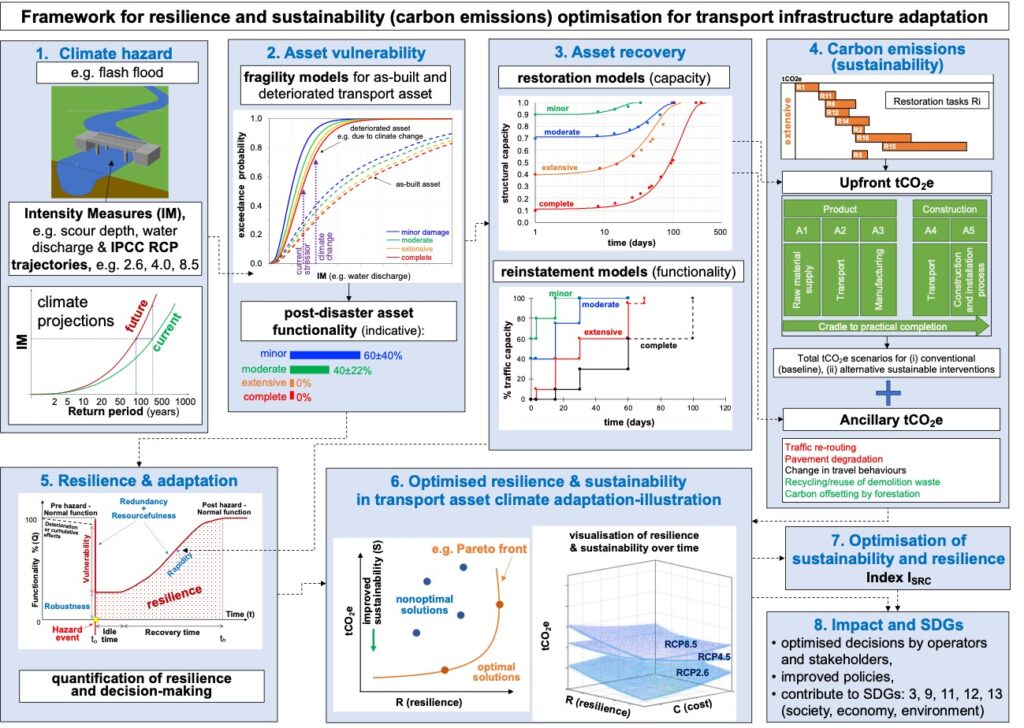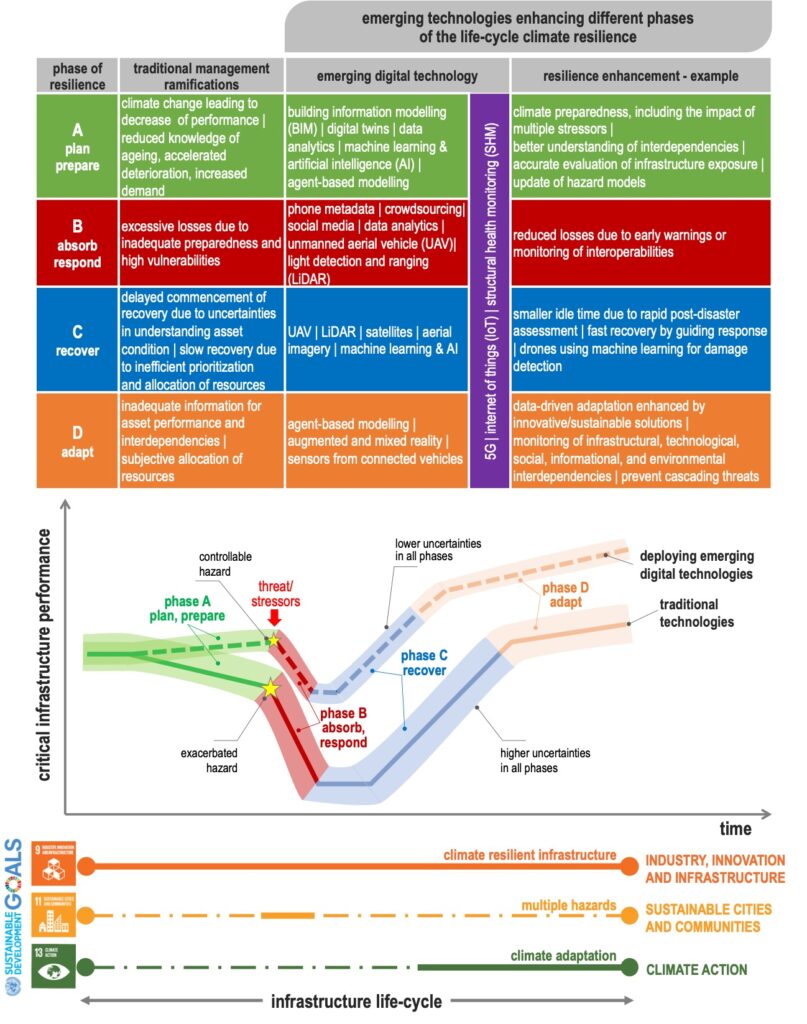ReCharged is a €1.6m research project funded by HORIZON-MSCA-SE-2021
See more on CORDIS website:
https://cordis.europa.eu/project/id/101086413
and ReCharged website: https://msca-recharged.eu
12 partners, 35 colleagues from 10 countries led mainly by women in engineering, 5 industrial partners, 6 universities and research and technology centres.
Project:
ReCharged – Climate-aware Resilience for Sustainable Critical and interdependent Infrastructure Systems enhanced by emerging Digital Technologies

In a few words: ReCharged has the vision to develop an integrated framework toward a practical visualisation platform to enable the digitalisation, optimisation and streamline of climate resilience and whole-life carbon emission assessments for interdependent Transport and Energy Systems, Lifelines and Assets. We do that by harnessing the power of digital technologies and data to quantify the functionality and recovery of infrastructure. To achieve this, we will train people through research, innovation, and dissemination activities of interdisciplinary and inter-sectoral exchanges.
ReCharged will facilitate the decision-making of operators, make people feel safer and augment researchers’ skills and career perspectives.
Partners:
Dr Stergios Aristoteles Mitoulis, University of Birmingham, UK – Scientific Coordinator
Dr Sotirios Argyroudis – Deputy Scientific Coordinator, Prof Evina Katsou, Prof Tatiana Kalganova, Brunel University London, UK
Dr Rallis Kourkoulis, Dr Mariana Loli, Dr Fani Gelagoti, Grid Engineers, Greece – Financial Management
Dr Igor Linkov, Dr Dalila Antunes, Factor Social, Portugal
Prof Eleni Chatzi, Dr Catherine De Wolf, ETH Zurich, Switzerland
Prof GianPaolo Cimellaro, Prof Marco Domaneschi, Politecnico di Torino, Italy
Prof Mathaios Panteli, Prof Stella Hadjistassou, Cyprus University, Cyprus
Dr George Suciu, Dr Carmen V Bobeanu, Dr Mihaela Balanescu, Dr Sachian Mari-Anais, BEIA, Romania
Dr Leon Kapetas, Dr L Liakou, Resilient Cities Network, Netherlands
Dr David García-Sánchez, Dr Diego Zamora, TECNALIA, Spain
Prof Gregory Kiker, Dr Eva Agapaki, Dr Ziynet Boz, University of Florida, USA
Dr Dan Bompa, Dr Bellen Marti-Cardona, University of Surrey, UK

Relative papers from infrastructuResilience:
Mitoulis SA, Argyroudis SA, Panteli M, Fuggini C, Valkaniotis S, Hynes W, Linkov I (2022). Conflict resilience framework for critical infrastructure peacebuilding. http://dx.doi.org/10.2139/ssrn.4159965
Mitoulis SA, Bompa DV, Argyroudis SA (2022). Sustainability and resilience trade-offs in post-disaster bridge recovery: floods and climate projections. http://dx.doi.org/10.2139/ssrn.4151393
Loli M, Kefalas G, Dafis S, Mitoulis SA, Schmidt F (2022) Flood resilience framework for transport networks with focus on bridges using GIS and remote sensing data. Science of the Total Environment (in review).
Loli, M., Manousakis, J., Mitoulis, S. A., & Zekkos, D. (2022). UAVs for Disaster Response: Rapid Damage Assessment and Monitoring of Bridge Recovery after a Major Flood. Engineering Proceedings, 17(1), 11.
Argyroudis SA, Mitoulis SA, Chatzi E, Baker JW, Brilakis I, Gkoumas K, Vousdoukas M, Hynes W, Carluccio S, Keou O, Frangopol DM, Linkov I (2022). Digital technologies can enhance climate resilience of critical infrastructure. Climate Risk Management, 35, 100387 https://doi.org/10.1016/j.crm.2021.100387 (awarded the 2022 Thorpe Medal of the European Council on Computing in Construction- EC3)
Loli M, Mitoulis SA, Tsatsis A, Manousakis J, Kourkoulis R, Zekkos D (2022) Flood characterization based on UAV mapping and forensic analysis of a structural failure, Science of the Total Environment. Vol. 822, 153661. https://doi.org/10.1016/j.scitotenv.2022.153661
Markogiannaki O, Chen F, Xu H, Mitoulis SA, Parcharidis I (2022). Monitoring of a landmark bridge using SAR Interferometry coupled with engineering data and forensics, International Journal of Remote Sensing. 43(1) :95-119 https://doi.org/10.1080/01431161.2021.2003468
Mitoulis SA, Domaneschi M, Cimellaro G-P, Casas J-R (2021) Bridge and transport network resilience – a perspective, ICE – Bridge Engineering -Themed Issue on Bridge and transport network resilience, https://doi.org/10.1680/jbren.21.00055 Kwabena FD, …,
Donkor FK, Mitoulis SA, Argyroudis S, Aboelkhair H, Ballesteros Canovas JA, Bashir A, Cuaton GP, Diatta S, Habibi M, Hölbling D, Manuel L, Pregnolato M, Ramos Ribeiro RR, Sfetsos A, Shahzad N, Werner C (2022). SDG final decade of action: Resilient pathways to build back better from high-impact low-probability (HILP) events. Sustainability, 14, 1540, https://doi.org/10.3390/su142215401
Argyroudis SA (2021) Resilience metrics for transport networks: a review and practical examples for bridges. Proceedings of the Institution of Civil Engineers: Bridge Engineering.
Argyroudis SA, Winter MG, Mitoulis SA (2021). Multiple hazard fragility analysis for granular highway embankments: moisture ingress and scour. Transportation Geotechnics, 26: 100431 https://doi.org/10.1016/j.trgeo.2020.100431
Smith A, Argyroudis SA, Winter MG, Mitoulis SA (2021). Economic impact of bridge functionality loss from a resilience perspective: Queensferry Crossing. ICE Bridge Engineering, https://doi.org/10.1680/jbren.20.00041.
Argyroudis SA, Mitoulis SA, Hofer L, Zanini MA, Tubaldi E, Frangopol DM (2020). Resilience assessment framework for critical infrastructure in a multi-hazard environment. Science of the Total Environment, 714, 136854. https://doi.org/10.1016/j.scitotenv.2020.136854